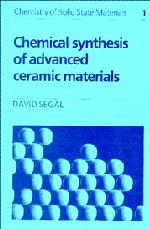Book contents
- Frontmatter
- Contents
- Preface
- Symbols
- 1 Introduction: the variety of ceramic systems
- 2 Conventional routes to ceramics
- 3 Ceramic fabrication
- 4 Sol–gel processing of colloids
- 5 Sol–gel processing of metal–organic compounds
- 6 Non-aqueous liquid-phase reactions
- 7 Polymer Pyrolysis
- 8 Hydrothermal synthesis of ceramic powders
- 9 Gas-phase reactions
- 10 Miscellaneous synthetic routes to ceramic materials
- Appendix: Determination of particle size
- References
- Index
- Frontmatter
- Contents
- Preface
- Symbols
- 1 Introduction: the variety of ceramic systems
- 2 Conventional routes to ceramics
- 3 Ceramic fabrication
- 4 Sol–gel processing of colloids
- 5 Sol–gel processing of metal–organic compounds
- 6 Non-aqueous liquid-phase reactions
- 7 Polymer Pyrolysis
- 8 Hydrothermal synthesis of ceramic powders
- 9 Gas-phase reactions
- 10 Miscellaneous synthetic routes to ceramic materials
- Appendix: Determination of particle size
- References
- Index
Summary
Advanced ceramic materials have attracted increasing attention throughout the 1980s from many disciplines including chemistry, physics, metallurgy and materials science and this multidisciplinary approach is illustrated by the diverse range of journals and conferences where information is disseminated. In addition the discovery of high-temperature ceramic superconductors in 1986 has raised the profile of advanced ceramics activities not only within the scientific community but also among the general public. Attendance at conferences and surveys of scientific literature show that chemical synthetic methods have played an increasing role, over the past fifteen years, in improving the properties of ceramic materials. Books concerned with fabrication and physical properties of ceramics do not, in my opinion, highlight chemical aspects of ceramic preparations which are not the principal interest of physical, organic and inorganic chemistry textbooks.
My discussions with undergraduate and postgraduate students in chemistry and materials science as well as university lecturers and those in industry concerned with research into and manufacture of advanced ceramics produced two conclusions. Firstly, there did not seem to be a short volume available which acted as a bridge between pure chemistry and conventional ceramic studies such as fabrication. Also, although scientific publications and conference proceedings proliferate it was not obvious how a comprehensive view of the rapid inroads chemistry is making into ceramic synthesis could be obtained. I see this book as that bridge between pure chemical and conventional ceramic studies. I have included a chapter on fabrication for continuity but this is not the main theme.
- Type
- Chapter
- Information
- Chemical Synthesis of Advanced Ceramic Materials , pp. xi - xiiPublisher: Cambridge University PressPrint publication year: 1989

